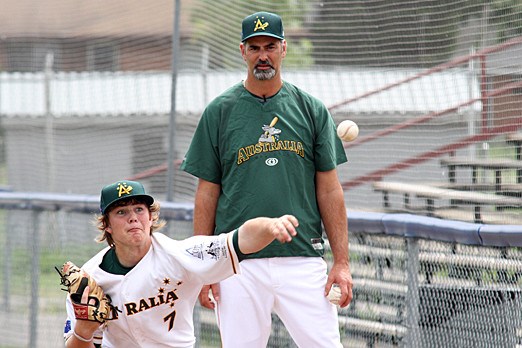When Graeme Lloyd began his major league career, he was just the fourth Australian to reach the big leagues.
Today 27 have made the grade and Lloyd, an 11-year veteran who won a pair of World Series with the New York Yankees in the 1990s, said that number is only going to continue to grow. Guys like Tampa Bay’s Grant Balfour, Atlanta’s Pete Moylan, Seattle’s Ryan Rowland-Smith and Los Angeles Angels hurler Richard Thompson have taken the reins, giving the next generation of players heroes to look up to and emulate.
But it won’t happen automatically.
The key is proper training, the 43-year-old retired southpaw said.
“When I grew up there wasn’t any baseball camp,” said Lloyd, who has assumed pitching coach duties with the Australian national under-18 squad at the World Junior Baseball Championship being staged in Thunder Bay between now and Aug. 1.
“These kids have just had a seven-week baseball camp with MLB, the Australian Baseball Federation. You get (guys like former major leaguers) David Nilsson, Rene Gonzalez, Rod Carew, Chili Davis, just to mention a few coaches, who have come down and helped get our baseballers better.”
Australian pitcher Jason Kilby is a shining example of a player who had someone to look up to, though in his case it was an older brother, not a major league star.
“It’s just the best game in the world,” Younis said, drawn to the game for its gentle finesse, rather than the bone-crunching kill-or-be-killed mentality found in other sports.
“You’ve got to be a perfectionist out there, that’s all there is to it.”
The Australians have four players under contract with a major league team, having signed a deal with the Minnesota Twins, including Ryan Battaglia and Andrew Campbell (Cleveland), Josh Warner (Philadelphia) and Jacob Younis (Minnesota).
Another product of the Australian system is former Thunder Bay Border Cats infielder Adam Courcha, who starred at Port Arthur Stadium last summer.
Kilby would love to follow in their footsteps, either in the United States or closer to home in Taiwan.
Still, despite the success of a few, competition from other sports doesn’t help baseball’s cause Down Under, where students are encouraged at the school level to play the more traditional game of cricket, Australian rules football and even soccer, another sport imported from afar.
The game itself has been in the country for more than a century-and-a-half, though it’s struggled to find its identity as either a summer or winter sport, the seasons being reversed in the southern hemisphere. It’s also been seen by many as something cricketers do in the offseason to keep in shape.
Visibility is helping change those traditional views, Lloyd said.
“We get baseball on TV now in Australia. We get 12 or 15 games a year, which is great, and hopefully that continues and grows. I think the kids in Australia see it as a growing sport and also a sport to play that, other than the traditional sports,” Lloyd said, taking a minute from an unexpected practice at Port Arthur Stadium on Friday afternoon, made possible when the Venezuelans bailed from the WJBC at the final minute.
“We’re getting the better athletes in that respect because they see they can play this sport. They’re (also) playing in T-ball and they’re playing in schools and it’s starting to progress.”
Lloyd said that doesn’t mean there isn’t more to be done.
“I think that MLB being involved with our new National (Baseball) League that’s coming out this year – I think we’re playing 40 or 50 games – I think that shows itself that we’re playing the game in Australia and will help.”
The Australians will take on the United States on Saturday at 2 p.m. at Port Arthur Stadium.
Australian manager Tony Harris said it’s tough knowing baseball isn’t considered a tier one sport in his home country, but there’s a core of coaches and players who are fighting to progress the sport and make Australia a world power down the road.
Like Lloyd, he sees the NBL as the best way to accomplish the goal, starting from the grassroots level on up.
“There’s a lot of activity, so we can only hope that that continues on and we tend to start to get the better athlete and more of them and start to compete with the footballs and crickets,” Harris said.
It can be done, he added.
“I think it’s just a shift in mentality. I mean soccer’s been able to do it pretty much throughout the world, and in Australia. If we can have an attractive game, a fast-paced game at the grassroots level and get the youngsters involved – like I said it’s one of our fastest growing sports Down Under at the moment. Then it’s a matter of retaining the numbers as they come through the elite levels.”
Australia takes on the United States Saturday afternoon at 2 p.m. at Port Arthur Stadium.
Sign in or register
- Messages
- Post a Listing
- Your Listings
- Your Profile
- Your Subscriptions
- Your Likes
- Your Business
- Support Local News
- Payment History
Registered Users
Already have an account?
New Users
Create a free account.



